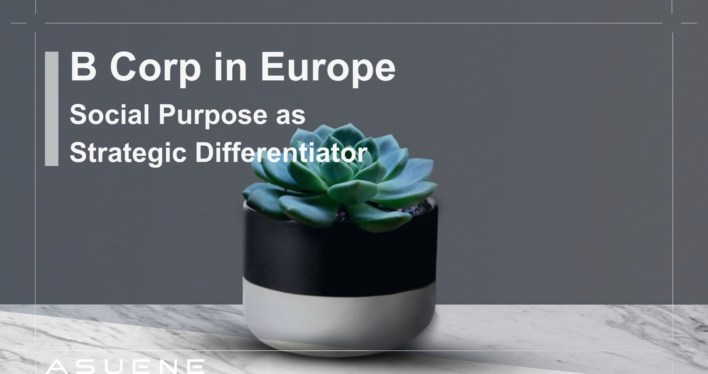- Article Summary
-
As environmental, social, and governance (ESG) criteria gain traction across the European Union, companies are increasingly turning to B Corporation (B Corp) certification as a signal of authentic, measurable, and mission-driven business conduct. Originating in the United States but rapidly expanding across Europe, B Corp status is now viewed not only as a label of corporate responsibility but also as a strategic differentiator in an ESG-conscious market. With the EU moving toward more robust sustainability regulation through instruments like the Corporate Sustainability Reporting Directive (CSRD) and the Green Claims Directive, businesses are under growing pressure to demonstrate verifiable environmental and social performance. B Corp is becoming a trusted method for achieving this.
This article explores the rise of B Corp in Europe across five key dimensions: the movement’s origins and structure; its growing influence across European markets; the practical integration of B Corp standards into ESG and regulatory frameworks; the strategic benefits for stakeholder engagement; and its role in helping businesses prepare for the EU’s regulatory future.
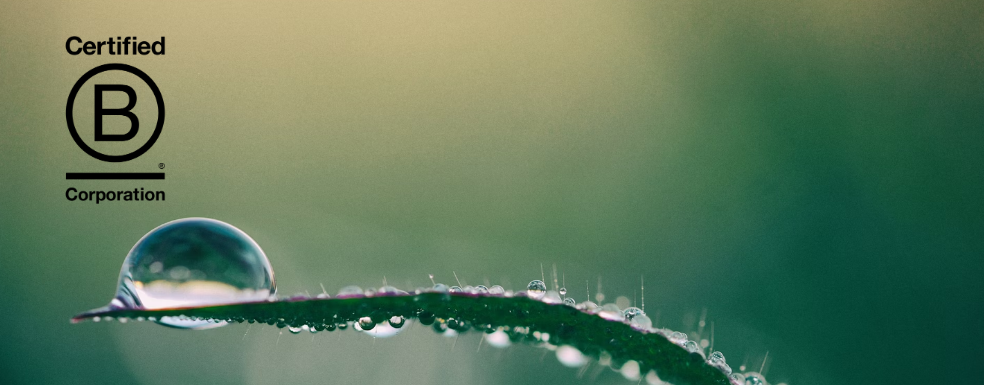
B Corp Origins and Framework: A New Definition of Business Success
B Corp certification was launched by the nonprofit B Lab in 2006 with the vision of redefining business success as something beyond profit. Certified B Corporations must demonstrate high social and environmental performance, legal accountability to all stakeholders—not just shareholders—and transparency through public disclosure of their impact. To achieve certification, companies undergo the B Impact Assessment (BIA), a comprehensive review across five pillars: governance, workers, community, environment, and customers. The assessment is scored out of 200 points, with 80 points required for certification.
In Europe, B Corp entered the market with relatively little traction in the early 2010s but gained substantial momentum after 2018, particularly among SMEs and mission-driven startups. The 2020s saw a significant uptick as larger firms, such as Danone and Nespresso, began seeking partial or full B Corp certification across subsidiaries. This expansion was also supported by a growing ecosystem of impact investors, ethical procurement networks, and civil society watchdogs promoting corporate accountability. Today, the BIA is not only used for certification, but also as a management and diagnostic tool for sustainability performance improvement—even by companies that do not seek full B Corp status.

Market Penetration and Sectoral Breakdown in Europe
According to data from B Lab Europe, the number of certified B Corporations in the EU has grown by more than 40% year-on-year since 2020, spanning industries from food production and fashion to technology and financial services. Countries like the Netherlands, France, Germany, and Italy lead in adoption, bolstered by strong consumer awareness and favorable regulatory environments. As of 2025, over 1,800 certified B Corps operate within the EU, with the figure expected to exceed 2,500 by 2026.
The movement is particularly strong in sectors with high consumer visibility and sustainability risk, such as apparel, food, and finance. In these industries, third-party verification of ESG performance is essential to maintain brand trust. For example, French sneaker brand Veja, Spanish eco-clothing firm Ecoalf, and Danish food producer Naturli’ Foods have leveraged their B Corp status to build reputation and access new retail partnerships.
B Corp Distribution by Sector in the EU (2025)
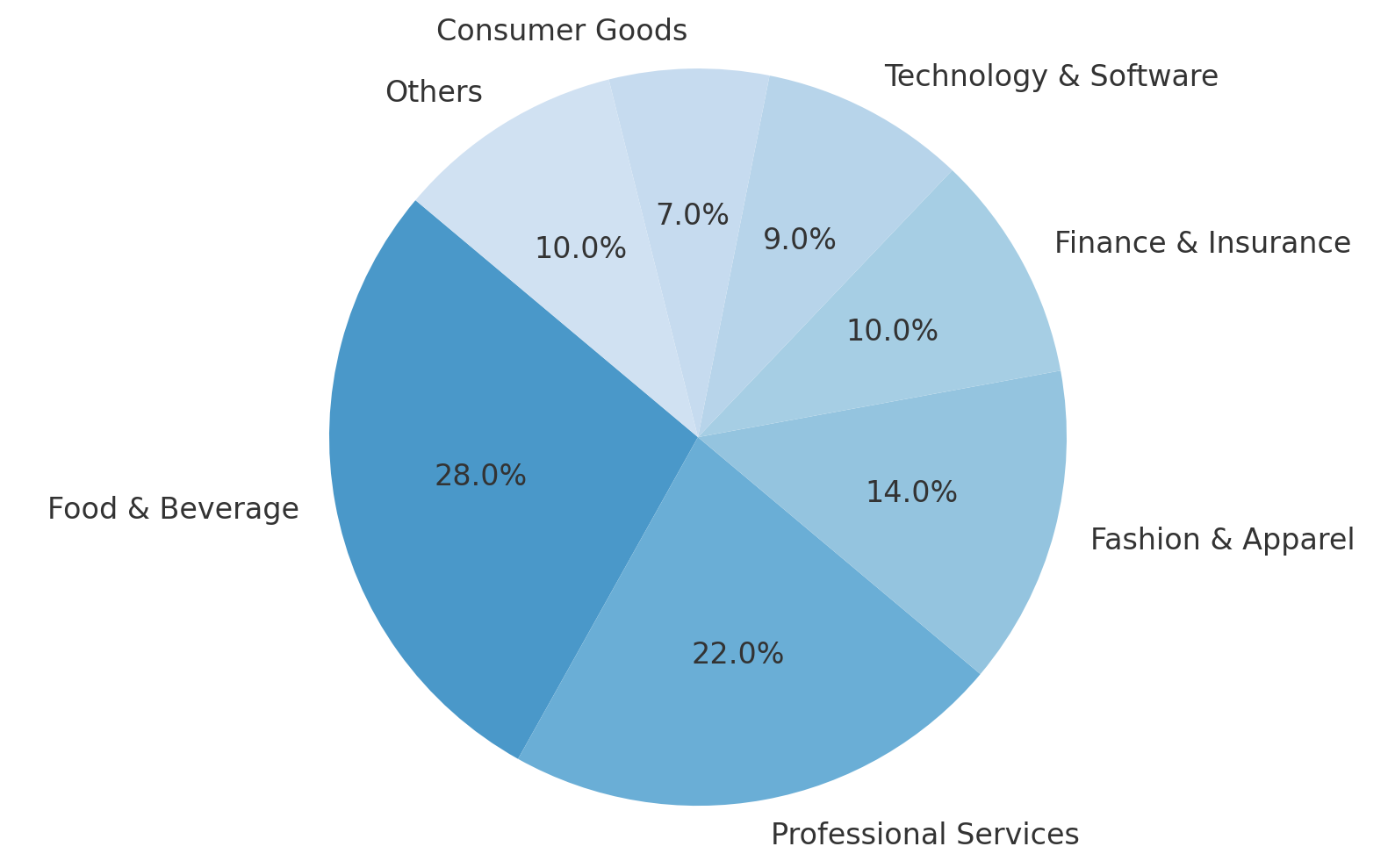
| Sector | % of Total | Estimated Number | Example Companies |
|---|---|---|---|
| Food & Beverage | 28% | 280 | Tony’s Chocolonely (Netherlands) |
| Professional Services | 22% | 220 | Glowfarms Consulting (Germany) |
| Fashion & Apparel | 14% | 140 | Veja (France), Ecoalf (Spain) |
| Finance & Insurance | 10% | 100 | Triodos Bank (Netherlands) |
| Technology & Software | 9% | 90 | Mindful Tech Ltd. (Sweden) |
| Consumer Goods | 7% | 70 | Naturli’ Foods (Denmark) |
| Others (Media, etc) | 10% | 100 | Too Good To Go (Denmark), Opopop (Belgium) |
Source: B Lab Europe, 2025
Strategic Value: ESG Integration and Regulatory Alignment
Beyond its reputational benefits, B Corp is increasingly seen as an operational ESG tool. Its rigorous and holistic standards closely align with emerging European regulations, such as the CSRD and the EU Taxonomy. For example, the B Impact Assessment evaluates supply chain policies, human rights practices, emissions management, and product life cycle impacts—criteria that mirror many aspects of regulatory reporting frameworks.
This makes B Corp particularly attractive to mid-sized firms that are not yet covered by mandatory ESG disclosure rules but want to prepare for them. It also provides a structure for aligning internal ESG strategies with external expectations. Several regional governments and public procurement agencies are now recognizing B Corp as a credible ESG qualifier for supplier contracts. Similarly, ESG-oriented investors use B Corp status as a screening factor when identifying mission-aligned portfolio companies.
A growing number of companies are using the BIA alongside other standards like the GRI, SASB, and ISSB to triangulate their ESG performance. This integrated approach enables businesses to reduce audit fatigue while improving the credibility and granularity of their sustainability data. In essence, B Corp is becoming a bridge between voluntary ethics and mandatory compliance.
Stakeholder Engagement and Competitive Advantage
One of the most distinctive aspects of B Corp is its emphasis on stakeholder governance. B Corps are required to amend their legal documents to expand fiduciary duty from shareholders to all stakeholders—employees, suppliers, communities, and the environment. This structural shift aligns with broader European movements advocating for stakeholder capitalism and corporate responsibility.
The practical effect of this change is visible in talent recruitment, customer loyalty, and investor confidence. Companies like Ecosia, the Berlin-based search engine that reinvests profits into reforestation, have successfully used B Corp to attract values-driven employees and partners. Likewise, Camif, a French home goods retailer, reports higher customer engagement due to its B Corp transparency practices, including publishing annual impact reports and supply chain audits.
Growth of B Corps in Europe (2020–2025)
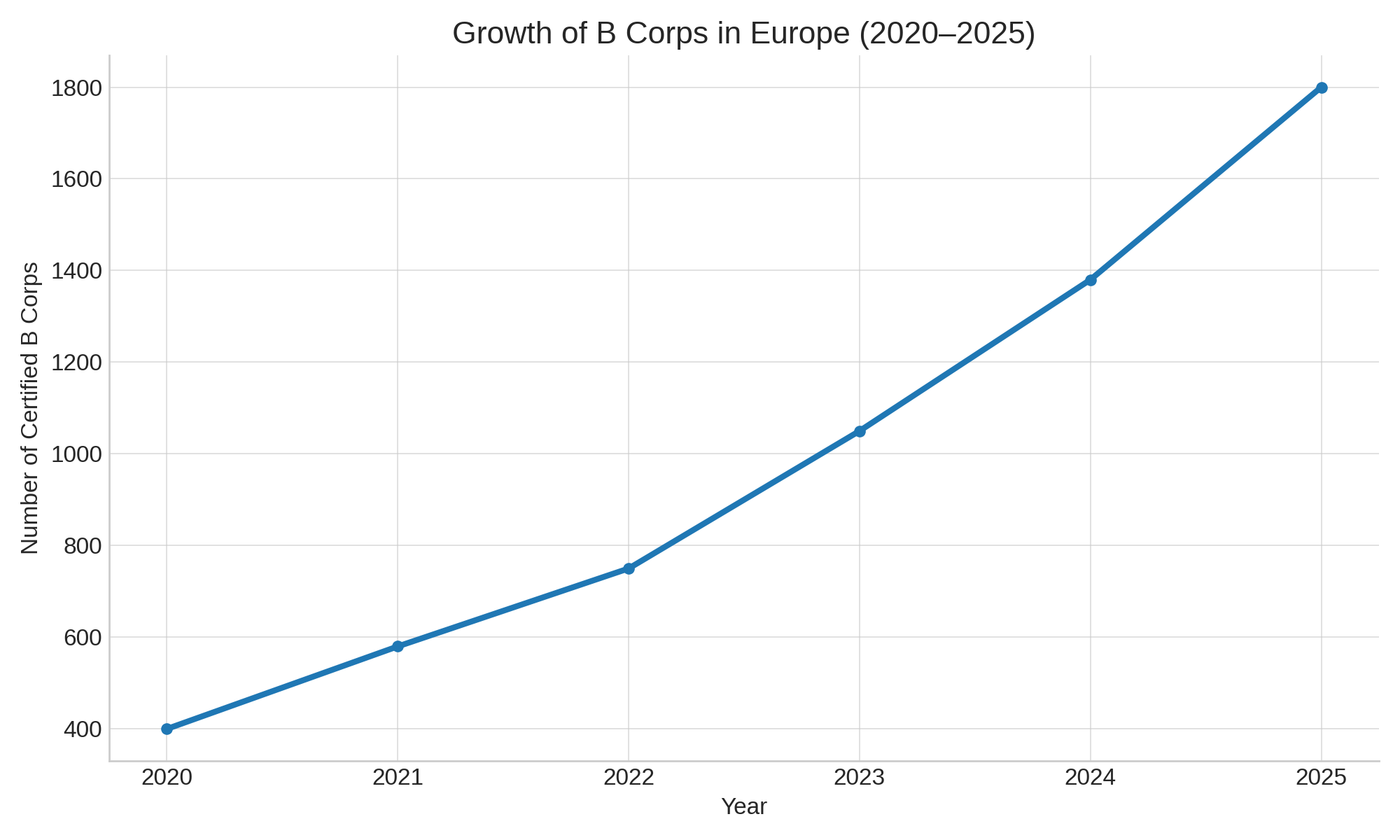
Even in business-to-business (B2B) contexts, B Corp status is becoming a competitive differentiator. Procurement departments at large corporations increasingly favor B Corps for supplier contracts, particularly in sectors like packaging, logistics, and consulting. B Corp’s measurable and transparent criteria also support companies’ efforts to meet their own Scope 3 emission and due diligence requirements.
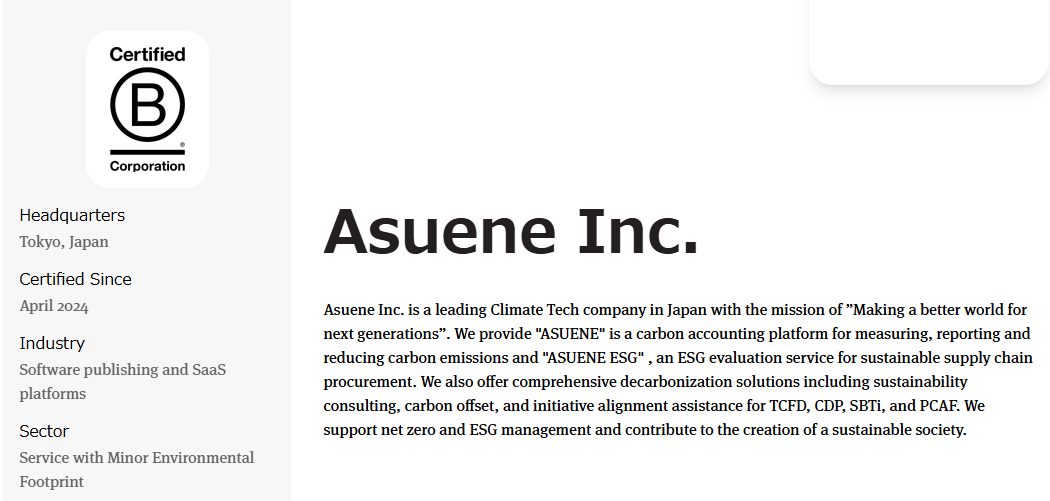
Conclusion: Preparing for a Purpose-Driven Future
With the EU poised to impose more stringent ESG regulations and global expectations shifting toward climate accountability and social justice, B Corp certification is emerging as a powerful tool for future-proofing corporate strategy. It offers companies a credible, structured, and mission-aligned approach to sustainability that goes beyond compliance and marketing.
As the European market becomes more saturated with environmental claims and ESG ratings, businesses will need a way to demonstrate substance over symbolism. B Corp fills that role by offering not just a certification but a comprehensive operational model rooted in transparency, accountability, and continuous improvement. For companies that embrace it, B Corp is more than a badge—it is a blueprint for thriving in a purpose-driven economy.
Why Work with ASUENE Inc.?
Asuene is a key player in carbon accounting, offering a comprehensive platform that measures, reduces, and reports emissions, including Scope 1-3, with expertise in decarbonization. Asuene serves over 10,000 clients worldwide, providing an all-in-one solution that integrates GHG accounting, ESG supply chain management, a Carbon Credit exchange platform, and third-party verification.
ASUENE supports companies in achieving net-zero goals through advanced technology, consulting services, and an extensive network.
